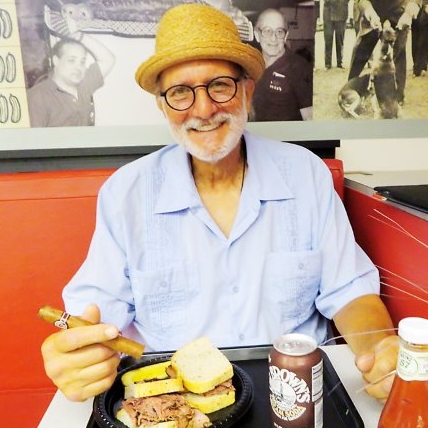click to dowload our latest edition
CLICK HERE TO SUBSCRIBE TO OUR NEWSLETTER


Published
7 years agoon
By
adminRON KAMPEAS
I’d only exchanged pleasantries with Gross in the several times I’d seen him since his release from a Cuban prison in December 2014, ending five years of imprisonment for his work connecting Cuba’s Jewish community to the Internet.
Gross, 68, wanted to tell me he and his wife, Judy, had made Aliyah. “”It was long overdue. I’d been going there for more than 40 years, and I’d worked in Israel and around the region.”
Gross was in Washington recently. We chowed down last week at Loeb’s on his precious pastrami and Dr Brown’s cream soda.
When he was arrested in 2009, Gross, then of Potomac, Maryland, was working as a subcontractor for the US Agency for International Development setting up Internet access for Cuban Jews. He wasn’t charged until 14 months into his detention, then “accused of being a threat to the integrity and/or independence of the state”.
Gross was released in December 2014 as part of a broader exchange in which three Cubans convicted of spying, were released from American prisons. The same day, President Barack Obama announced renewed ties with the communist nation.
As a contractor who worked in development, Gross was especially busy in Israel and the Palestinian areas, working on joint Israeli-Palestinian development after the launch of the Oslo peace talks in 1993.
“I was in Israel probably 60 times before I made aliyah,” he said.
Alan and Judy Gross live in Tel Aviv. They have a daughter living in Jerusalem with her wife and their daughter, the Grosses’ granddaughter.
“My other daughter got married this weekend [near Portland, Oregon], and she and her husband are teachers and are going to move to China,” he said.
Gross could not pinpoint a time he started thinking about making aliyah. “I can’t say Cuba had anything to do with it,” he said. “I don’t think my Jewish background had anything to do with my treatment.
“The first time I went,” when he was 28, “my wife and I co-led a group of 45 teenagers for 45 days for BBYO. Six months later I was working for BBYO.”
He spent four years with the Jewish youth organisation and another four working for the Jewish federation in Washington, DC, and then he returned to his chosen field, development.
In Israel, Gross also wanted to vote. He cannot hide his disappointment with Prime Minister Benjamin Netanyahu and his endless coalition compromises, most recently resulting in the freeze of an agreement with non-Orthodox Jews on worship at the Western Wall.
“If you don’t like what’s going on in Israel,” he said, “make aliyah and vote.”
What’s his favourite thing about Israel? “Walking. Every day I walk up to the Carmel Market, into Jaffa and to the Tel Aviv port.”
Also, public transportation. He marvels about Israel’s public transportation and notes it takes him 90 minutes to get from his daughter’s home in Jerusalem to his Tel Aviv flat.
He also kvells about a cigar store in Tel Aviv called Brill, where he meets every Friday afternoon with an array of aficionados and talks politics and “fake news” over cigars, hummus and whisky. He acquired the cigar habit in jail.
Would he go back to Cuba given the chance?
“I’d go back in a heartbeat,” he said.
Gross has written twice to the Cuban Embassy here just wanting to talk. He hasn’t heard back. He wants to see the families of his cellmates, who brought him food.
“They helped sustain me for five years,” Gross said. “They’re my family, too.” He lost five teeth to poor nutrition during his time in jail.
“They had a lot more cigars than food,” he said of the Cuban authorities. “Fifty per cent of the arable land in Cuba is not being cultivated.”
What does he think of President Donald Trump’s rollback of President Barack Obama’s moves to lift travel and commercial restrictions with Havana?
Gross is not a fan of Trump. “He’s so much invested in reversing anything Obama did, if Obama walks forward to avoid tripping over something, Trump would intentionally walk backwards and trip on it,” Gross said.
Gross is an avid social media presence, and Trump is a favourite target.
“There is a difference between not fit and unfit, not competent and incompetent. The POTUS is the latter in both,” he wrote recently on Twitter, using the acronym for the president of the United States.
“Facebook enabled me to reconnect with a lot of friends and family,” he said. “People didn’t know how to react to me; a lot of people wanted to get together right away, others thought I wanted to be left alone. It’s a wonderful network.
“Twitter is a different story; Twitter could be really brutal. I try not to give rabid responses. Sometimes I fail.”
He does not begrudge Obama the time he waited to be released.
“The decision to bring me home could have only been made in the Oval Office. Was it made late? Yeah, but there are other things going on in the world, things that are also important, maybe more important than Cuba, because Cuba represents no threat to anyone.”
He is also grateful to three lawmakers who led the fight for his release: Senators Patrick Leahy, Democrat Vermont and Jeff Flake (Republican Arizona) and then-Representative Chris Van Hollen (Democrat Maryland), who is now a US senator, as well as to the organised Jewish community.
“The reality is it was the grassroots effort in the Jewish community who tipped the effort,” he said. “There were tens of thousands of e-mails, literally tens of thousands, that’s what tipped the scales. My redemption from Cuba is a story of activism.”
What does Gross want the world to know?
That he was not a spy and Cuba’s authorities never considered him one.
